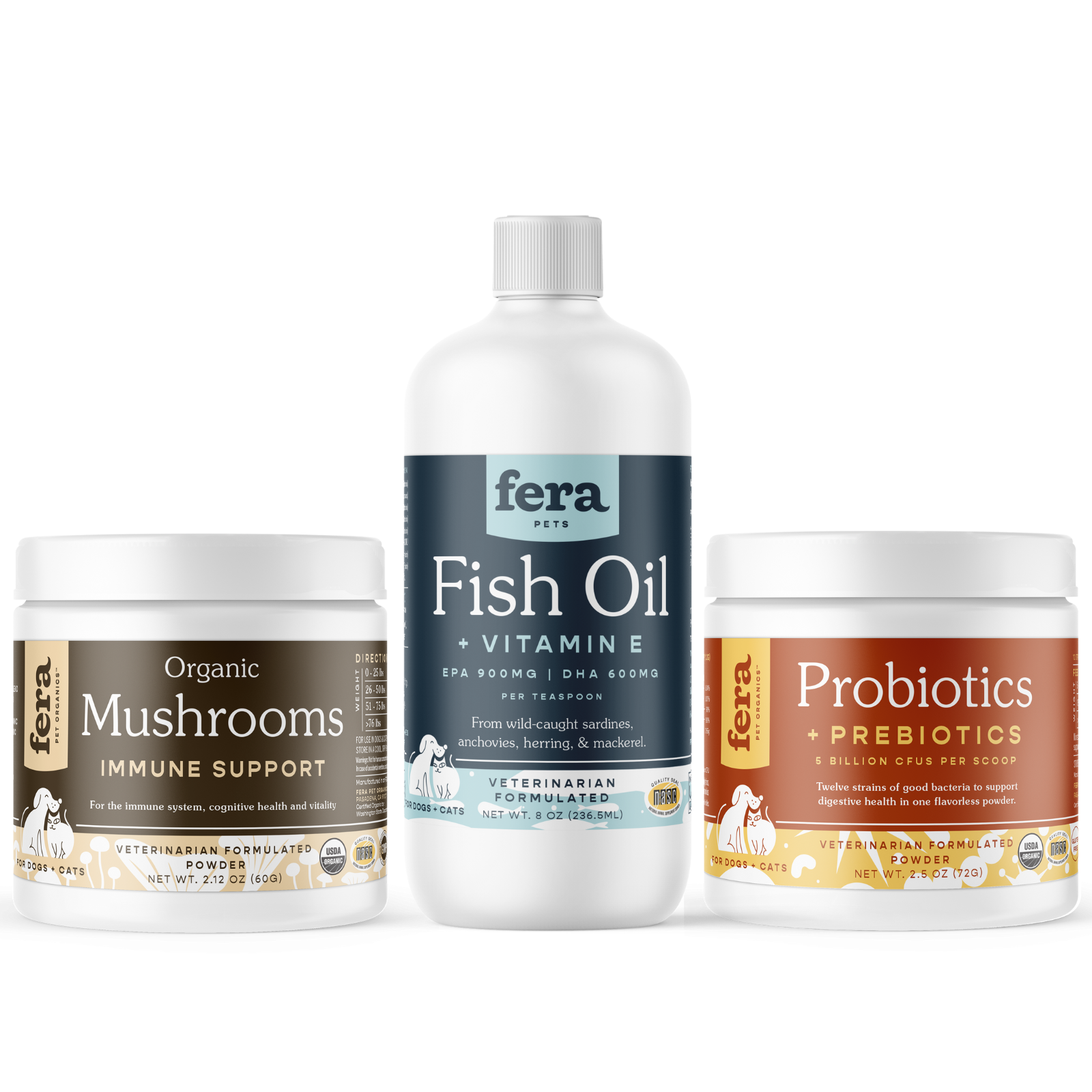Skin Allergies in Pets and What Pet Parents Should Know This Allergy Season
This spring, don't overlook your pet's discomfort! Unseen allergy symptoms lurk in your furry companion's skin, wrecking their happiness. Discover the causes, signs, and treatments for skin allergies in pets—protect your four-legged family members from seasonal suffering.
Spring is upon us, and so is allergy season. The budding flowers and trees bring pollen and other substances that induce many uncomfortable symptoms in people, but did you know that spring allergies can be just as unpleasant for your furry companions?
While we experience symptoms like coughing and sneezing, your pet’s allergies will manifest in the form of skin problems that may be easy to miss if you’re not familiar with the tell-tale signs.
Here is everything you need to know about skin allergies in pets and preparing your four-legged family members for the allergy season.
Causes of Seasonal Allergies in Pets
Your pets can experience allergies any time of year, but most cases occur in the springtime. This comes as no surprise since many of the environmental substances that trigger our allergies can also set off our pets’.
Some of the most common springtime allergens that are known to kickstart pet allergies include:
- Tree and flower pollen
- Ragweed
- Grass
- Mold
- Mildew
- Spores
Insect bites can also cause skin allergies in pets, and since many bugs come out of hiding in the springtime, they could very well be the culprit. Check your pet’s skin for any signs of a bite from:
- Fleas
- Mosquitos
- Horseflies
- Ants
If environmental substances and insect bites have been ruled out as the catalyst for your pet’s allergies, make sure your pet isn’t allergic to synthetic chemicals in their environment such as your perfume or their cat litter.
It’s also possible that your pet has an allergy to an ingredient in their food. Food molecules in beef, chicken, wheat, soy, and dairy are some of the most common inciters of pet food allergies.
Symptoms of Skin Allergies in Pets
The most prevalent sign of allergies in pets is excessive scratching. If it seems your four-legged friend is struggling with an insatiable scratch, look for other symptoms such as:
- Gnawing at the paws
- Swollen paws
- Licking
- Sneezing, coughing, wheezing
- Vomiting
- Diarrhea
If you believe your pet may be showing signs of allergies, I highly recommend scheduling an appointment with your veterinarian to discover what is causing their symptoms and how to alleviate them.
Atopic Dermatitis in Pets
In most cases, your pet’s allergies can be easily managed with a good dietary supplement like fish oil or a probiotic. However, some pets will have a more severe reaction and develop a skin disease known as atopic dermatitis.
This condition stems from an overreaction to allergens and brings with it a number of troublesome symptoms like:
- Excessive scratching, especially around the paws, front legs, face, and ears
- Red, inflamed, or greasy skin
- Musty odor coming from the skin
- Increased licking of affected areas
- Hair loss
Atopic dermatitis is also a stimulant for more concerning problems like skin infections, ear infections, and yeast infections. This is why it’s important to set up a treatment plan with your veterinarian as soon as you recognize the symptoms.
Treatment Option for Skin Allergies in Pets
The only surefire way to effectively treat your pet’s skin allergies is to identify the responsible allergen. This is usually done through intradermal allergy testing, a procedure in which a small amount of allergens is injected into your pet’s skin. The injection site will then be monitored for any signs of a reaction.
60-70% of pet allergies are caused by environmental substances, so it’s likely that your pet’s symptoms will be concurrent with the seasons, spring in particular. If this is the case, you’ll need to be prepared to treat your companion’s allergies annually.
Here are some of the best options to help you get started.
Natural Pet Supplements
Supplements are a great way to give your pet’s body the boost it needs to fight off those pesky allergies, but with so many on the market today, it can be overwhelming to find just the right one for your pet.
As a veterinarian, I believe supplements made with clean, organic ingredients are the most effective, which is why my best friend and I started Fera Pet Organics. We use only the purest active ingredients in each of our supplements for dogs and cats, and every decision we make is backed by science.
Here are the supplements formulated to help your pets beat their allergy symptoms:
- USDA Organic Mushroom Blend: This organic mushroom blend is designed to strengthen your pet’s immune system and digestive system, which in turn leads to healthier skin.
- Fish Oil + Vitamin E: The fatty acids in this do-it-all supplement decrease inflammation in the skin, joints, and other organs. That way, your pet will enjoy healthier skin, an improved immune system, and cardiovascular endurance.
- USDA Organic Probiotics with Prebiotics: Your pet’s gut plays a huge role in their overall health, including the vitality of their skin. The good bacteria and beneficial prebiotics found in this tasteless powder will help keep your little buddy’s digestive system in perfect balance.
Hypoallergenic Shampoo
A warm bath with a good hypoallergenic shampoo is an easy way to calm your pet’s agitated skin. When purchasing a shampoo, look for ingredients like oatmeal, aloe vera, and Vitamin E.
During the allergy season, it’s best to give your pet a good bath approximately once a week. If they’re not a fan of baths, try a sponge bath instead.
Keep Your Home Clean
It’s easy for allergens to make their way into your home, especially during the springtime. By frequently sweeping your floors and dusting the shelves, you can keep those allergens from invading your space and triggering your and your pet’s allergies.
Anti-Inflammatory Drugs
In more severe cases of skin allergies, your veterinarian may recommend an anti-inflammatory drug. Antihistamines and corticosteroids can be given orally or through a long-acting injection and are known to minimize the effects of an allergic reaction.
Apoquel and Cytopoint are other prescription drugs that your veterinarian may recommend and are effective in decreasing pruritus (itchiness) and inflammation in the skin.
Fuel Your Pet’s Wildest Adventures With Only the Best Supplements
Unlock your pet's health potential with expert advice from Dr Michelle Dulake! Start making informed decisions today with her cutting-edge insights, backed by years of experience and research. Don't miss out – secure a brighter, healthier future for your furry friend!
We believe that your pets deserve the absolute best, even when it comes to their dietary supplements.
I personally formulate all of our products to ensure we’re offering the most efficacious supplements on the market. Each batch is 3rd party tested for purity and potency and made with clean, high-quality ingredients that you can trust.
Explore our collection of organic supplements for dogs and cats and be sure to subscribe to our newsletter to get insider access to more health tips, new products, deals, and more.





